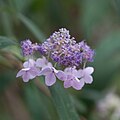Bract hydrangea
| Bract hydrangea | ||||||||||||
|---|---|---|---|---|---|---|---|---|---|---|---|---|

illustration |
||||||||||||
| Systematics | ||||||||||||
|
||||||||||||
| Scientific name | ||||||||||||
| Hydrangea involucrata | ||||||||||||
| Siebold |
The bract hydrangea ( Hydrangea involucrata ) is a small shrub belonging to the hydrangea family . It is sometimes used as an ornamental plant because of the decorative flowers . The natural range is in Japan.
description
The bract hydrangea forms 1 to 1.2, rarely 2 meter high shrubs with densely hairy young shoots. The leaves are simple and have a stem 6 to 25 millimeters long. The leaf blade is oval to elongated ovate, 7.5 to 15 centimeters long, pointed with a wedge-shaped base and serrated leaf margin. Both sides, but especially the underside of the leaf, are hairy with bristles.
The flowers are arranged in umbels up to 12 centimeters wide . When blooming, the inflorescences are spherical, 2 to 3 centimeters thick and covered by two to three large, round, white or bluish bracts that later fall off . The few sterile flowers grow on the edge of the inflorescence. They are 1.5 to 3 centimeters wide, white, rarely pink or bluish and have long stalks. The fertile flowers are mostly pink.
The species blooms from July to September.
The number of chromosomes is 2n = 30.
photos
Distribution and location
The natural range is on the Japanese islands of Honshū , Kyushu and Shikoku . The species grows in species-poor or cool, moist forests on moderately dry to moist, slightly acidic to slightly alkaline, gravelly or sandy-loamy soils in partially shaded locations. It is usually frost hardy.
Systematics
The bract hydrangea ( Hydrangea involucrata ) is a species from the genus of hydrangeas ( Hydrangea ) in the hydrangea family (Hydrangeaceae), subfamily Hydrangeoideae, tribe Hydrangeae. It was first described by Philipp Franz von Siebold in 1829 .
use
The bract hydrangea is sometimes used as an ornamental wood because of its decorative flowers .
proof
literature
- Andreas Roloff , Andreas Bärtels: Flora of the woods. Purpose, properties and use. With a winter key from Bernd Schulz. 3rd, corrected edition. Eugen Ulmer, Stuttgart (Hohenheim) 2008, ISBN 978-3-8001-5614-6 , pp. 338–339.
- Jost Fitschen: Woody flora . 12th, revised and expanded edition. Quelle & Meyer, Wiebelsheim 2007, ISBN 3-494-01422-1 , p. 528 .
Individual evidence
- ↑ German name after Roloff et al .: Flora der Gehölze , p. 338 and Fitschen: Gehölzflora , p. 528
- ↑ a b c d Roloff et al .: Flora der Gehölze , pp. 338–339
- ↑ Fitschen: Gehölzflora , p. 528
- ^ Hydrangea involucrata at Tropicos.org. In: IPCN Chromosome Reports . Missouri Botanical Garden, St. Louis
- ↑ a b Hydrangea involucrata. In: Germplasm Resources Information Network (GRIN). United States Department of Agriculture, accessed March 20, 2012 .
Web links
- Hydrangea involucrata. In: The Plant List. Retrieved March 20, 2012 .


